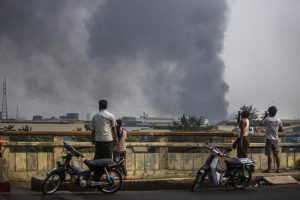Attacks on Chinese-run factories in Myanmar’s biggest city drew demands Monday from Beijing for protection for their property and employees, while many in Myanmar expressed outrage over China’s apparent lack of concern for those killed in protests against last month’s military coup.
A Chinese Foreign Ministry spokesperson said the Chinese Embassy had contacted authorities in Myanmar and urged that police be deployed to protect the Chinese companies and personnel.
Police and firefighters were sent to protect the factories, which are scattered across several industrial zones in Yangon, spokesperson Zhao Lijian told reporters in Beijing. He said China was closely watching and “is very concerned about the impact on the safety of Chinese institutions and personnel.”
A statement posted by the Chinese Embassy to Myanmar on Facebook about the efforts to protect Chinese businesses triggered an outpouring of fury in more than 52,000 comments.
“Does it hurt? How about people dying?” said a post from Naing Oo.
“If you want to do business peacefully in Myanmar, respect Myanmar people,” said Aye Myat Kyaw. “Stop supporting terrorist army and join Myanmar people.”
Many accused Myanmar police or other agitators of causing the destruction to try to incite more trouble.
More than 100 civilians have been killed by security forces since the February 1 coup, according to a tally by the Assistance Association for Political Prisoners. Many more have been injured, and thousands have been arrested.
The attacks on Myanmar’s garment factories have injected an extra complication into an already very complex situation. A fair share of the hundreds of garment factories in Myanmar’s biggest city, Yangon, and other major cities are run by Chinese manufacturers. Most are private companies and many are suppliers to big-name fashion, sports, and household goods retailers.
Taiwan, South Korea, Hong Kong, and Thailand also have a large number of manufacturers running factories in Myanmar that play a crucial role in providing jobs and exports that help keep the economy afloat.
Taiwan’s representative office in Yangon recommended that Taiwan-owned companies use Burmese language signs to identify their factories as a “Taiwan Enterprise.” It also advised them to hang Taiwan’s national flag outside and explain to local employees and people living nearby that their factories are Taiwan-run, not from mainland China, to help minimize risks.
Myanmar’s military leaders have often chafed at China’s outsized influence over their economy. But Beijing’s adherence to a policy of non-interference in other countries’ politics has already angered many who are protesting the coup that ousted the elected government of Aung San Suu Kyi, with some calling for boycotts of Chinese products.
The protesters have been appealing for support from other countries and the United Nations to restore civilian rule, staging protests and strikes in a massive show of civil disobedience that has nearly paralyzed the economy.
Myanmar state media have reported that martial law was declared in six districts in Yangon, including the major industrial zones of Hlaing Thar Yar and Shwepyitha. At least 38 people were killed Sunday and dozens were injured in one of the deadliest days of the crackdown on anti-coup protesters, according to the Assistance Association for Political Prisoners.
The state-run Myanmar News Agency, which like most other media in the country is controlled by the military, reported that five factories were set afire in Hlaing Thayar, a factory area to the west of Yangon.
It said protesters had blocked roads, hindering fire engines from reaching the blazes.
One of those named, Global Fashion Garment Factory, is a Chinese-owned supplier to the fashion retailer C&A, according to a list on the C&A website.

































